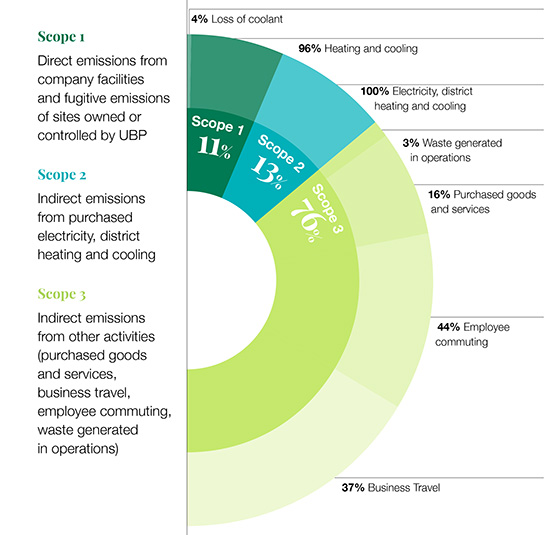Today sees the publication of UBP’s 2022 Sustainability Report which outlines its sustainability vision and strategy, while providing a transparent account of its progress, achievements and challenges.
The report covers both responsible investment and corporate social responsibility (CSR), the two pillars of our sustainability strategy, and also includes a dedicated climate risk report, in line with the recommendations of the Task Force on Climate-related Financial Disclosures (TCFD).
Fine-tuning our sustainability approach
As global challenges intensify, adapting to the new investment landscape has become a priority to protect and grow our clients’ wealth, while channelling financial flows towards the green transition.
“The economic transformation ahead is a source of opportunities for our clients, and we recognise the importance of integrating sustainability across our business with agility and pragmatism.”
Guy de Picciotto, Chief Executive Officer
To equip ourselves for this transition, we reinforced our sustainability set-up with the hiring of a Group Head of Sustainability, who is refining and implementing the Bank’s strategy together with a team of seasoned professionals.
Sustainable finance regulation on the rise
2022 was a critical year for sustainable finance regulations, and much of our work focused on putting into place the right processes for complying with these regulations.
In terms of Asset Management, we increased the number of SFDR Article 8 funds (promoting environmental and/or social characteristics) to 42 and the number of Article 9 funds (having sustainable investment as an objective) to five. As a result, these funds now account for more than two-thirds of AUM in our public funds in 2022, up from one-third in 2021.
This increase was driven by both improvements in the sustainability approach taken by existing strategies and the launch of new ones, in particular our fourth impact strategy and our transition infrastructure strategy.
On the Wealth Management side, we developed a questionnaire in order to better understand our clients’ sustainability preferences after the MiFID II requirements regarding sustainability preferences came into force, and gave our Front Office colleagues tailored training on the topic.
Responsibly managed and sustainable assets
With increasing regulation, the understanding surrounding responsible and sustainable investments is crystallising, and we decided to reflect this in the way we classify our assets.
Adopting a more cautious approach, coupled with a difficult year for financial assets, meant that responsibly managed assets totalled some CHF 21 billion, down from CHF 24 billion in 2021. Despite this year-on-year drop, we have achieved our objective of doubling assets in responsibly managed strategies from our baseline of CHF 7.5 billion.
Spotlight on UBP’s operational emissions
With the lifting of Covid restrictions, commuting and business travel picked back up, resulting in a 27% rise in our overall carbon emissions. However, thanks to a number of energy-saving measures and an increase in the share of renewables used (with renewable electricity use reaching 88%), we were able to keep our total emissions 36% below the 2019 baseline figure.
However, to reach our goal of reducing our total emissions by 25% by 2025 compared with 2019, we must now scale up our efforts to tackle emissions from commuting and business travel, which respectively account for 33% and 28% of our overall emissions.
Share of GHG emissions by scope and source
Talent management
As a people-driven business, attracting, retaining and developing talent is key. To ensure that our workforce has the necessary knowledge and skills to successfully navigate new challenges, we have been supporting our colleagues in obtaining external sustainability qualifications, and have continued to promote our internal sustainability e-learning programme, which has been completed by over 1,800 employees.
As a reflection of wider market practices, we rolled out our work-from-home policy. A survey of eligible employees in Switzerland highlighted the success of this policy, with 90% of respondents stating that the policy gives them a better work-life balance.
Community engagement
Last, the report highlights how we continued to support our communities through cultural, social and environmental projects and sponsorship. For example, over 160 colleagues participated in UBP’s clean-up events, and many got active for the Globetrotter Challenge which helped raise CHF 7,500 for charity.
The launch of our CSR Awards was a key moment of 2022. During its first year, six awards were presented in recognition of employee engagement in environmental and social activities.









